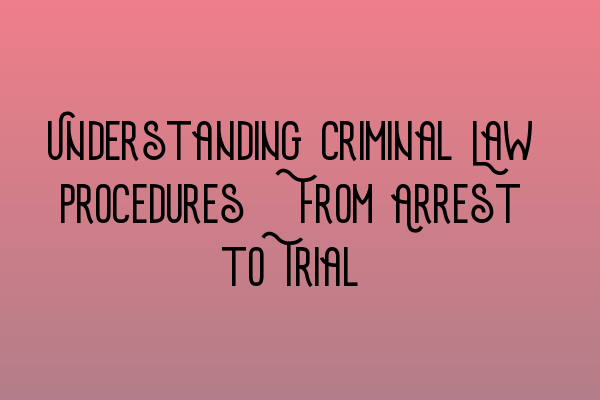Understanding Criminal Law Procedures: From Arrest to Trial
When it comes to navigating the complex world of criminal law, understanding the procedures involved from arrest to trial is essential. This guide aims to provide you with a comprehensive overview of the key stages involved in a criminal case.
1. Arrest
The first step in any criminal case is the arrest. This occurs when a law enforcement officer has reasonable grounds to believe that a person has committed a crime. The arrested individual is then taken into custody for questioning and further investigation.
If you or someone you know has been arrested and are seeking legal representation, it’s crucial to consult with an experienced criminal law solicitor. They can offer guidance and support throughout the entire legal process.
2. Charging
Following an arrest, the next stage is charging. This involves the prosecutor reviewing the evidence collected during the investigation and determining whether there is enough evidence to proceed with the case.
The prosecuting solicitor will then file a formal charge, also known as an indictment, stating the specific crime(s) the accused is being charged with.
3. Bail
Once charged, the accused may have the opportunity to seek bail. Bail is a process in which the court grants temporary release to the accused while awaiting trial.
However, the court will consider various factors, such as the severity of the crime, the individual’s criminal history, and the likelihood of flight, before deciding whether to grant bail. If the court determines that the accused poses a significant risk, they may be remanded in custody until the trial.
4. Preliminary Hearing
After the accused has been charged and potentially released on bail, a preliminary hearing may be scheduled. The purpose of this hearing is to determine whether there is enough evidence for the case to proceed to trial.
During the preliminary hearing, both the prosecution and defense will present their arguments and evidence. The court will then decide whether there is a prima facie case against the accused, meaning that there is enough evidence to proceed to trial.
5. Disclosure
Following the preliminary hearing, the prosecution is required to disclose all evidence they intend to rely on during the trial to the defense. This includes witness statements, forensic reports, and any other evidence relevant to the case.
It is crucial for the defense to carefully review the disclosed evidence to identify any weaknesses in the prosecution’s case and develop a strong defense strategy.
6. Trial
If the case proceeds to trial, both the prosecution and defense will present their cases in court. The prosecution will present evidence and call witnesses to support their case, while the defense will challenge the prosecution’s evidence and present their own evidence and witnesses.
It is essential for individuals facing criminal charges to have skilled legal representation to ensure their rights are protected and to present the best possible defense.
7. Verdict and Sentencing
After all evidence has been presented, the court will deliberate and reach a verdict. If the accused is found guilty, the court will proceed to sentencing.
The sentencing phase takes into account various factors, including the severity of the crime, any aggravating or mitigating factors, and the defendant’s criminal history. The court will then determine an appropriate punishment, which may include imprisonment, fines, probation, or a combination of these.
Conclusion
Understanding criminal law procedures is crucial for both those facing criminal charges and anyone seeking to navigate the legal system. From the initial arrest to the final verdict, each stage plays a vital role in ensuring a fair and just process.
If you’re preparing for the SQE Criminal Law & Practice exam or looking for further resources on criminal law, consider checking out our related articles:
- SQE 1 Practice Exam Questions
- SQE 1 Practice Mocks FLK1 FLK2
- SQE 2 Preparation Courses
- SQE 1 Preparation Courses
- SRA SQE Exam Dates
